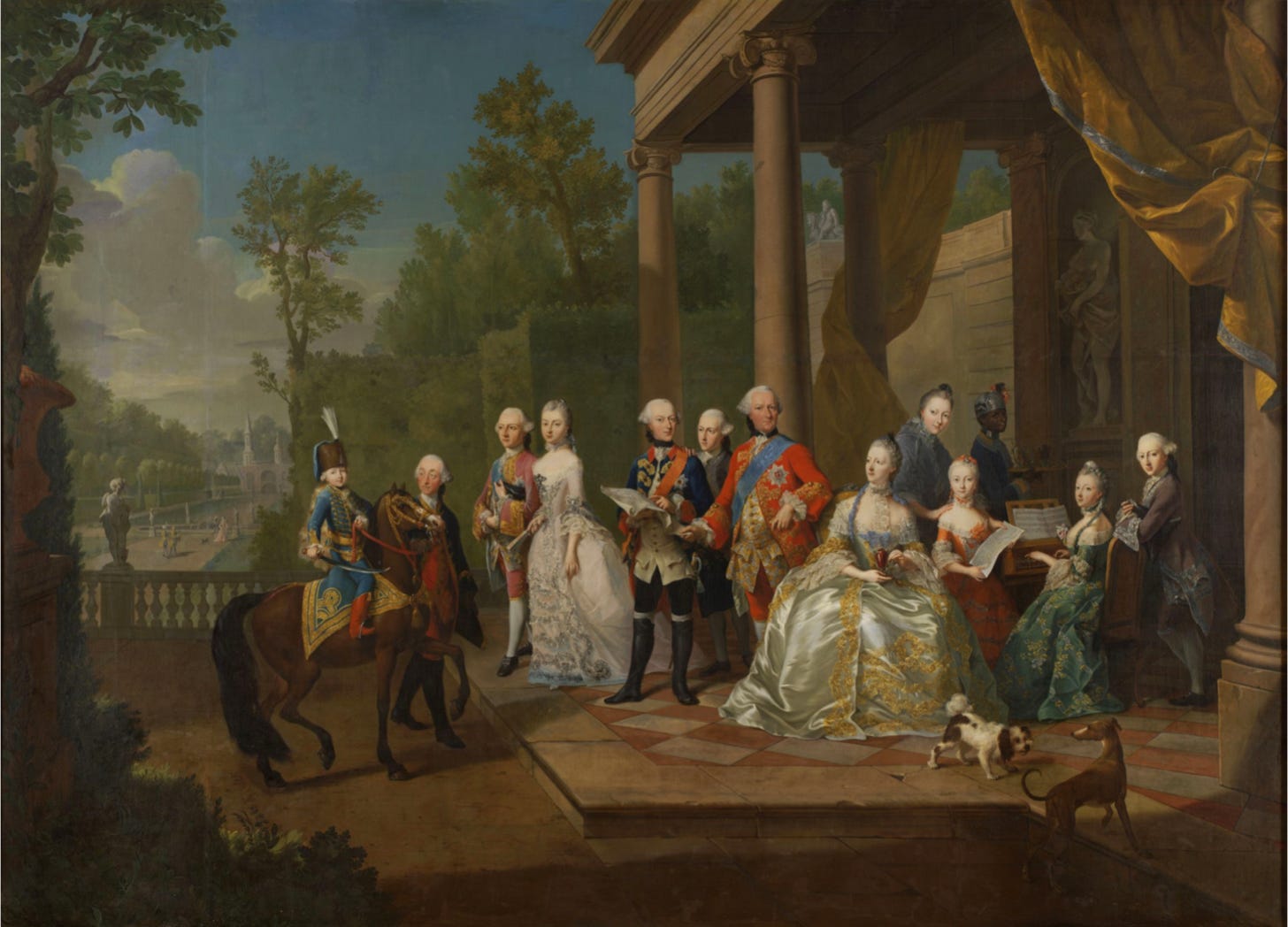The Blue Brunswickers (Background)
A decision-forcing case study
The year is 1762.
You are Friedrich Adolf Baron Riedesel of Eisenbach, a member of the Hessian lower nobility. For the past three hundred years, most of your male ancestors have been involved in public service, whether as soldiers, civil servants, or clergymen.
As is often the case with noble families of recent origin, your coat of arms makes a play on words. In particular, the central figure, the head of a donkey (Esel) munching on a reed (Ried), refers to the first half of your surname. (By the way, while English-speaking people often refer to you as ‘Baron von Riedesel’, they ought to call you ‘Baron Riedesel of Eisenbach’.)
You were born in 3 June 1738, in the castle of Eisenbach, near the town of Lauterbach, in Hesse-Darmstadt, one of the three hundred or so component states of the Holy Roman Empire of the German Nation. Your father, Baron Johann Wilhelm Riedesel of Eisenbach, served as a judge on the supreme court of the Holy Roman Empire, the Reichskammergericht. Your mother, born Sophia von Borcke, came from a family that has held estates in Pomerania for more than six hundred years.
Having decided that you should become a diplomat, your father sent you to study law at the University of Marburg. Thanks, however, to your relative youth, your lack of a proper secondary education, and your passion for military matters, you proved a mediocre student. In 1755, when you were seventeen, you dropped out of university in order to join, with the rank of officer cadet, an infantry battalion of the army of the state of Hesse-Kassel.
Soon after the start of your military career, your battalion deployed to England, where it took up quarters near London in order to protect that city against a possible French invasion. In the autumn of 1757, after spending two years in England, your battalion returned to Germany. There it joined the army of Ferdinand, Duke of Brunswick, which was fighting against the French forces that had invaded western Germany.
Over the course of the two years that followed, you often served as an ‘ordnance officer’, transmitting orders from Duke Ferdinand to his subordinates, conducting reconnaissance patrols, and evaluating dynamic military situations. This duty provided you with ample opportunity to demonstrate both your skill as a horseman and your coup d’oiel.
The efficiency with which you performed these duties brought you to the attention of Duke Ferdinand, who became your patron. In the spring of 1761, he arranged for your transfer from the army of Hesse-Kassel to that of the much smaller state of Brunswick-Wolfenbüttel, then ruled by his older brother, Duke Charles. This transfer included a commission as a lieutenant colonel and command of a recently-raised regiment of hussars.

A Regiment of Hussars
Formed in 1759, your regiment consists of six squadrons, each with an authorized strength of 114 officers, non-commissioned officers, and men. While capable of the full range of duties expected of a light cavalry unit, it specializes in the ‘small war’. Also known as ‘partizan warfare’, this involves the conduct of patrols and raids in the frequently forested terrain of the ‘neutral ground’ that separates the main bodies of field armies.
As you have just added a sixth squadron to your regiment, the building blocks of your unit are smaller than they are supposed to be. Thus, rather than fielding the 114 hussars that it rates, the average present-for-duty strength of one of your squadrons hovers around 83.
You and your men dress in the Hungarian-style uniform worn by most horsemen characterized as hussars in the middle years of the present century. Each hussar in the regiment is armed with a saber, two pistols, and a carbine.
During the tenure of your predecessor, Lieutenant Colonel Roth, the regiment suffered from an epidemic of desertion. Some ascribe this to the failure of Roth to ensure that men were paid on time. Others explain it by pointing to the large number of former members of the Austrian army who have recently been incorporated into the unit.
The War in Germany
The present war in Germany, which has been going on since 1756, is part of a world-wide conflict in which ‘black men fought on the coast of Coromandel and red men scalped each other by the great lakes of North America’.1 The local war has consisted consisted, in essence, of periodic French attempts to seize control of the Electorate of Hanover. (The largest of the many states of the Holy Roman Empire located entirely in western Germany, Hanover is ruled by Prince-Elector George III. His Most Serene Highness also occupies, as King George III, the thrones of Great Britain and Ireland.)
The struggle for Hanover began in earnest in the summer of 1757, when a French army invaded the country. After winning a battle at Hamelin (home of the famous Pied Piper), the French occupied the capital of the Electorate, the city of Hanover. In 1758, an Anglo-Hanoverian force defeated a French army at Minden, and, in the weeks that followed, succeeded in liberating most of the territory lost in the previous year.
In the four years that followed, the belligerents located in western Germany refrained from major operations. Instead, each employed light troops of various kinds to patrol the ‘no man’s land’ between the armies, looking for information that might indicate the assembly or movement of substantial forces.
The next post in this series will describe a problem faced by the Baron Riedesel zu Eisenbach and his hussars.
For Further Reading
Thomas Babington Macauley ‘Frederick the Great’ in Hannah More Macaulay Trevelyan (editor) The Complete Works of Lord Macauley (London: Longmans, Green, and Company, 1879) Volume VI, pages 660-661










"coup d’oiel" is "seeing the field", no?
like Wellington was known for?